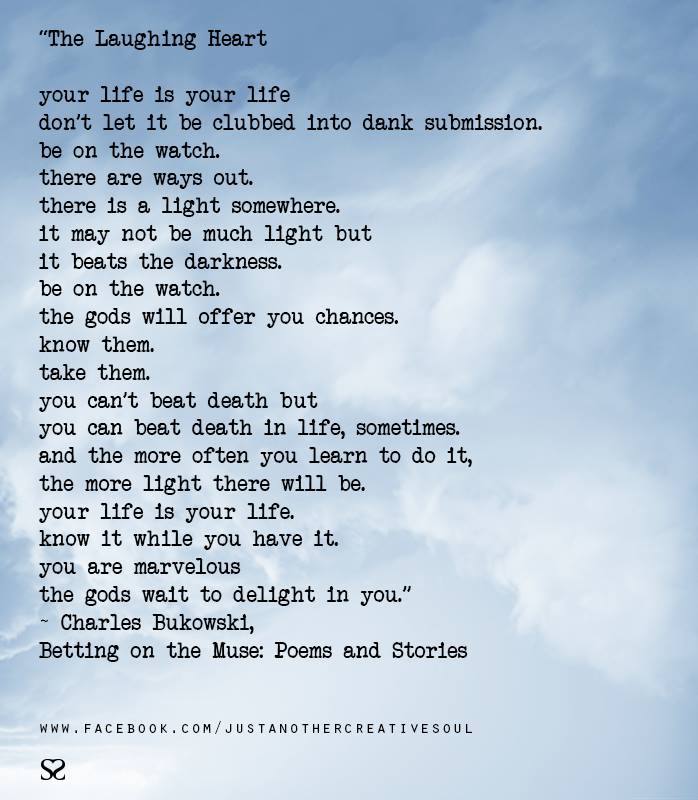Life is a poem, and then you die. Well, that line sounded a lot more profound when it was in my head than it does when it appears in pixels. I’m no poet, although there was a time when I expressed my teenage angst in words that rhyme. Kinda like that. I even posted some of my work from those long-ago days here. There’s a reason I became a mailman rather than a writer.
The Only Way
Perhaps the best way
Is your way
Maybe the best belief
Is not to believe
Maybe the only answer
Is no answer
And maybe the only time
Is this time…
And yet,
Why can’t our love
Be the only love?
Alone
Alone in my fantasies
Alone with my dreams
But when I wake with the dawning
One sullen fact remains
That I am alone in my love for you—
The sun doesn’t shine, it rains.
See what I mean? The scary thing (besides the bad poetry) is that all these years later I am still more or less living those sentiments. Talk about being a slow learner!
But this post is about a real honest-to-goodness poet I truly admire–Charles Bukowski. Perhaps I’m a selfish reader of poetry, but my favorites are the ones whose words resonate with the thoughts and emotions I have experienced. I grew up around poetry; some of my earliest memories are of my father reading poems out loud to us kids. Over the years I’ve collected dozens of books by the likes of Sara Teasdale, e e cummings, James Kavanaugh, and various anthologies.

And nope, I’ve never owned a book of Bukowski poems. I actually discovered him relatively late in life. In fact, as I was preparing this post I saw where I had written about reading him for the first time back in November 2005. That post included a link to a Bukowski biography that is also quite interesting. I love the fact that he too is a former postal worker.
Convinced, then, almost from the outset of the hopelessness of humanity and lasting friendship, he largely rejected the goals after which most strive. Instead, he found solace in alcohol. “Getting drunk was good,” Bukowski says in Ham on Rye. “I decided that I would always like getting drunk. It took away the obvious and maybe if you could get away from the obvious often enough, you wouldn’t become obvious yourself” (189). Drinking and remaining “unobvious” thus became Bukowski’s vocation, until, that is, he started writing seriously around 1960. Then drinking, remaining “unobvious,” and writing were his vocations, and remain so to this day. Necessitated by the fact that none of his vocations paid enough for him to survive, he worked as dishwasher, truckdriver and loader, mailman, guard, gas station attendant, stock boy, warehouseman, shipping clerk, post office clerk, parking lot attendant, Red Cross orderly, and elevator operator, among other things (Contemporary Authors 109).
Heh, I guess the drinking part is something else we have in common. But that’s obvious, right?
So yesterday’s rain kept me confined to the house and passing away the hours on the internet. Which led me to discover this article about a new documentary called You Never Had It: An Evening With Charles Bukowski.
The paradox of Bukowski was that he was a poet who wrote about drinking, screwing, the track, despair and fighting, but had a persona that was gentle, mirthful and self-deprecating. It’s easy to imagine his voice, with its gentle lisp, used today for guided meditation audio. When Bukowski talks about “drinking and fucking and drinking and fucking” it’s with a shy smile and playful eyes that won’t always connect with the interviewer. It’s telling that Bukowski, the author of books like Love is a Dog from Hell, Women and Post Office, loved classical music, particularly Beethoven. Despite the dipsomania, he spoke with great precision.
Is it any wonder I like this guy?
So I was inspired to spend some time reading Bukowski poems yesterday. I didn’t like everything I came across, but this one stood out for some reason.
“Alone With Everybody”
the flesh covers the bone
and they put a mind
in there and
sometimes a soul,
and the women break
vases against the walls
and the men drink too
much
and nobody finds the
one
but keep
looking
crawling in and out
of beds.
flesh covers
the bone and the
flesh searches
for more than
flesh.
there’s no chance
at all:
we are all trapped
by a singular
fate.
nobody ever finds
the one.
the city dumps fill
the junkyards fill
the madhouses fill
the hospitals fill
the graveyards fill
nothing else
fills.
Powerful stuff, at least to my troubled mind.
My favorite Bukowski poem remains “The Laughing Heart“. I’ve shared it here several times, but the first time was the night I discovered it: Christmas Eve 2015. And what made it especially special was the way I found it:
Jee Yeun and I had recently split up and I was very bitter and cynical about love. I was lamenting to a bar friend about the forlorn state of my psyche, when this stranger walks up to me and says “I’m sorry to eavesdrop, but don’t ever give up!” Then she asked if I’d ever read “The Laughing Heart” by Charles Bukowski. Now, I’m a sucker for poetry and have read some of Bukowski’s stuff, but never this particular poem. So I grabbed my phone and pulled it up for a quick read. Well, that hit the spot. And I was very moved by the random act of kindness of the person who reached out and shared it.

And it is still raining.

A family friend recently forwarded to me a series of photos showing painted staircases from around the world: artistic efforts to make life just a bit less boring. Many of those photos were incredibly beautiful: from the correct angle, the staircases formed portraits of famous people, various types of still life, or evocative abstract images. I thanked my friend for sending over those moments of beauty. It’s important to remember that life contains such moments, which may be ephemeral, but which nevertheless leave a mark as they pass.
In that spirit, then, thanks for sharing these moments of literary beauty. There is power in words.
Thanks for the kind words. I think I’ve seen a couple of those stairway photos (or something similar) but not as nice as the ones you describe.
I enjoy good poetry as well McCrarey. One of my favorite poets is Andrew “DICE” Clay. Here is a tidbit of his writings,
“Jack and Jill went up the hill each with a buck and a quarter. Jill came down with two fifty”.
If that doesn’t move you than you are heartless. Peace Out.
Jill is a hard-working girl! Er, a girl working hard. Um, you know what I mean!